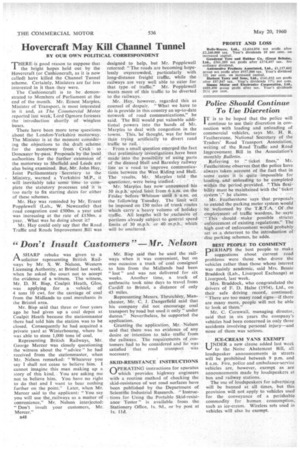Police Should Continue To Use Discretion
Page 82

If you've noticed an error in this article please click here to report it so we can fix it.
I T is to be hoped that the police will continue to use their discretion in connection with loading and unloading of commercial vehicles, says Mr. H. R. Featherstone, National Secretary of the Traders' Road Transport Association, writing of the Road Traffic and Road Improvement Bill in the Association's monthly Bulletin.
Referring to " ticket fines," Mr. Featherstone observes that the police have alw.ays taken account of the fact that in some :cases it is quite impossible for loading. and. unloading to be completed within the period -provided. "This flexibility must be maintained with the" 'ticket
system '," he claims. "
Mr. Featherstone says that proposals to extend the parking meter system would . be _welcomed by the T.R.T.A. Of the ' employment of traffic wardens, hesays: '-"This should Make possible stricter enforcement of existing regulations." The high cost-of enforcement would probably act as a deterrent to the introduction of disc parking schemes, he adds.
BEST PEOPLE TO COMMENT DERHAPS the best people to make suggestions about current road problems were those who drove the vehicles rather than those whose interest was mainly academic, said Mrs. Bessie Braddock (Lab., Liverpool Exchange) at Liverpool, last week.
Mn. Braddock, who congratulated the drivers of F. D. Halse (1954), Ltd., on their safe driving record, continued: " There are too many road signs—if there are many more, people will not be able to look at them."
Mr. C. Cornwall, managing director, said that in six years the company's vehicles had been concerned in only three accidents involving personal injury—and none of them was serious.
_ICE-CREAM VANS EXEMPT
UNDER a new clause added last week to the Noise Abatement Bill, all loudspeaker announcements in streets will be prohibited between 9 p.m. and 8 a.m. Fire, police and ambulance-service vehicles are, however, exempt as are announcements made by loudspeakers at bus and railway stations.
The use of loudspeakers for advertising will be banned at all times, but this provision will not apply to vehicles used for the conveyance of a perishable commodity for human consumption, such as ice-cream. Wireless sets used in vehicles will also be exempt.




















































































































